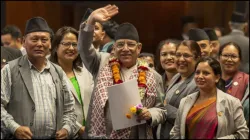Nepal recalls ambassadors from 11 nations, including India. Here's why
The Nepalese government recalled envoys from 11 countries, including Shankar Sharma in India, on Thursday despite reported reluctance from its foreign minister. Kaji Shrestha said some of these envoys performed well, and the decision would send an undiplomatic message to the world.

Kathmandu: The Nepalese government has recalled ambassadors from as many as 11 countries, including those in India and the United States. The action came despite strong reservations from Nepal's deputy Prime Minister and Foreign Minister Kaji Shrestha, according to local media reports, saying that such a move sends an undiplomatic message.
The move came ahead of Nepal Prime Minister Pushpa Kamal Dahal 'Prachanda's' visit to New Delhi on Sunday to witness Indian Prime Minister Narendra Modi's swearing-in ceremony. The meeting of the Council of Ministers chaired by PM Prachanda endorsed Prachanda's India visit. Earlier, Prachanda had paid an official visit to India from October 4 to 7, 2023 after assuming the post of the Prime Minister for the third time.
Nepal Prime Minister 'Prachanda' congratulated his Indian counterpart on the electoral success of his party-led alliance. "Congratulations to PM @narendramodi on the electoral success of BJP and NDA in the Lok Sabha elections for the third consecutive term. We are happy to note the successful completion of the world’s largest democratic exercise with enthusiastic participation of the people of India," he said in a post on X.
Why has Nepal recalled ambassadors?
The ambassadors were appointed under the Nepali Congress' quota, but Prachanda terminated his alliance with the party and joined hands with KP Sharma Oli in March. Dahal, a former Maoist guerrilla leader in the mountainous nation, formed a coalition cabinet dominated by the Nepali Congress party as well as other smaller groups last year.
Party officials said Dahal, 69, wanted to remove some "non-performing" ministers including Finance Minister Prakash Sharan Mahat, who is from the Nepali Congress, saying he had not done enough to boost growth of the $40 billion economy. Dahal’s Maoist Centre party and the Nepali Congress are also claiming the chair of the upper house of parliament the National Council, a parliamentary body key to making new laws.
However, Foreign Minister Shrestha had reportedly been opposing the proposal to recall ambassadors appointed in the quota for the Nepali Congress and other parties, but Prime Minister Dahal and CPN-UML Chairman Oli unilaterally decided to recall the ambassadors, a minister told the Kathmandu Post.
Foreign Minister Shrestha reportedly told both Dahal and Oli not to recall all 11 envoys because the performance of some of them was good, according to the unnamed minister. Dahal and Oli are learnt to have pressured Shrestha to accept the move which was later decided by the Cabinet.
Who are the recalled ambassadors?
The recalled ambassadors are Shankar Sharma (India), Sridhar Khatri (USA), Gyan Chandra Acharya (United Kingdom) and Jyoti Pyakurel Bhandari (South Korea). They were appointed in the quotas allotted to the Nepali Congress when the party president Sher Bahadur Deuba headed the government in 2021. Sharma, Acharya and Khatri were recommended ambassadors in October, 2021.
Other ambassadors whose terms were cut short are Naresh Bikram Dhakal (Qatar), Nawaraj Subedi (Saudi Arabia), Sharmila Parajuli Dhakal (Spain), Ram Swartha Ray Yadav (Denmark), Kanta Rizal (Israel), Dilliraj Poudel (Malaysia) and Salin Nepal (Portugal). Dhakal, Rizal and Nepal were also appointed in the Congress quota before the party left the Dahal-led government in March. The envoys have been given three to four weeks to return, according to a minister.
This came after Prachanda secured the vote of confidence for the fourth time on May 20 after breaking off the alliance with the Nepali Congress. This was Prachanda's fourth vote of confidence within one and a half years after he assumed the top executive position on December 25, 2022. Members of the main opposition Nepali Congress, which is the largest party in the lower house, did not participate in the voting as they were staging protests in the House.
The Prime Minister is required to take a vote of confidence within 30 days if the party the Prime Minister is representing splits or if a member of the coalition government withdraws support. The Janata Samajbadi Party (JSP) withdrew its support last week while quitting the coalition government.
(with inputs from PTI)
ALSO READ | Nepal PM Prachanda wins vote of confidence for the fourth time since becoming Prime Minister
